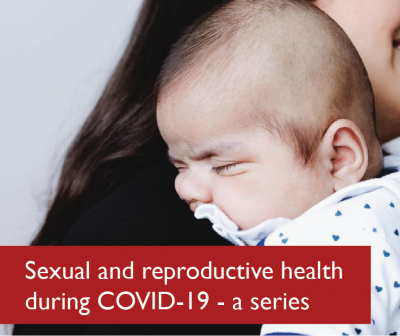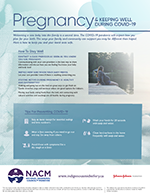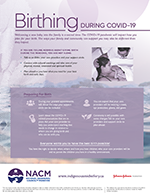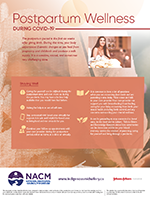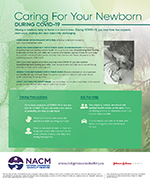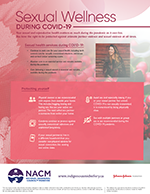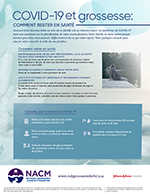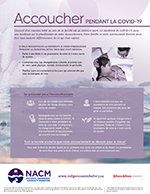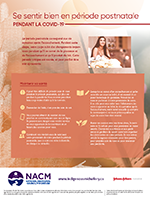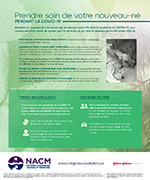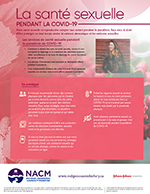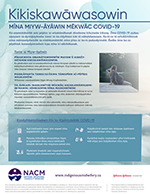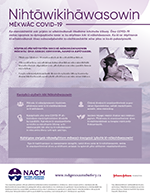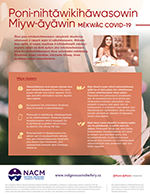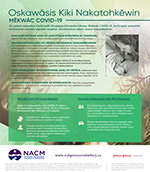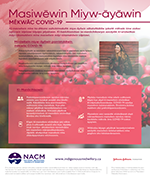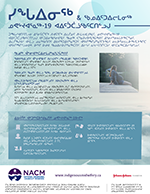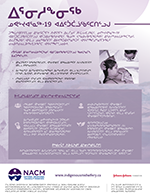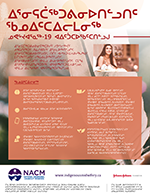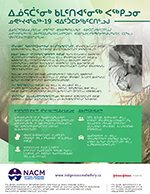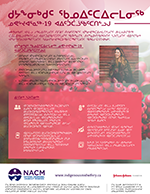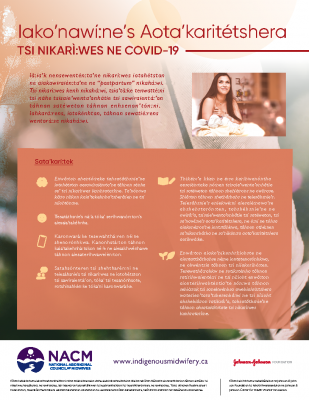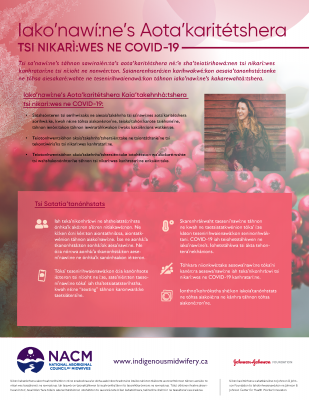As Indigenous midwives we provide care for pregnant people and newborns, our Elders and many others in our communities. Our care often extends beyond the clinic, beyond pregnancy and birth. We care for those who already live with illnesses and compromised immunity, for those living in overcrowded homes, struggling with mental illness, substance use and trauma. COVID-19 is a new and added layer to our work. Our communities are at the front lines of an inequitable system. It is a system that leaves us with limited supplies, inadequate or no clinical space and is painfully slow to respond to our needs. This pandemic will reiterate something we know well: we need midwives providing care in our communities.
This web page shares Statements, Resources and Media about the work of midwives and to support the work of midwives in the context of COVID-19.
As we face the challenges of COVID-19, we will continue honoring what our ancestors taught us. Indigenous midwives: you are a critical, invaluable resource in your community. Look after yourself. Be safe. Know that you carry knowledge that will allow our communities to be stronger and survive this pandemic as we have survived in the past.
Jump to a topic
Statements
Reproductive Justice during the COVID-19 Pandemic: A Call to Action from Midwives
May 13, 2020 – NACM and CAM advocate during the COVID-19 pandemic, and at all times, that a reproductive justice framework be applied to all perinatal care services. Marginalized groups continue to advocate and resist persistent injustices and inequities, calling for recognition, representation, reparation, and reconciliation. NACM and CAM recommend that governments, policy makers, and healthcare professionals undertake specific actions to support reproductive justice. Read more >
SOGC, CFPC, NACM, CAPWHN and CAM Joint Statement on Support Persons in Labour
April 24, 2020 – Due to the COVID-19 pandemic, hospitals around the world have been forced to rethink their policies at all levels of care in order to protect staff and patients alike. This new reality has forced some hospitals into making difficult decisions when it comes to how they care for their pregnant patients in labour. Read more >
CAM/NACM Joint Statement: Flexible Frameworks for Safe and Quality Midwifery Care during COVID-19
April 17, 2020 – CAM and NACM have released a statement that recommends governments, public health authorities, and decision-makers consider how childbirth occurs in the context of COVID-19 and put in place flexible frameworks for perinatal care provision to ensure the safety of birthing people, families, and health care providers during this pandemic.
The key recommendations from this document are:
- Prepare for temporary restructuring of perinatal care services.
- Protect the health and safety of front-line care providers, including midwives.
- Maintain equitable, safe, and quality care to pregnant people and their newborns.
- Protect communities where access to health care is limited or non-existent.
CAM and NACM Statement: Midwives as Essential Primary Care Providers in the Context of COVID-19
April 3, 2020 – CAM and NACM release a statement urging all governments to follow the proposed recommendations to ensure optimal use and deployment of midwifery services during the COVID-19 pandemic. We encourage all midwifery associations to share this statement with their respective governments, regional and public health authorities and employers. Read the statement >
NACM Statement: Words from our Ancestors
March 20, 2020 – As we watch how COVID-19 – and our responses – unfold, it is clear this virus is not just affecting our bodies. Our bodies are vulnerable, but so are our spirits. The toll this could take on our mental and emotional well being is real. Read the statement >
Resources
Sexual and Reproductive Health During COVID-19
As Indigenous midwives, we know that COVID-19 has an impact on sexual health, pregnancy, birth plans, and post-partum wellness. In response to this, and in preparation for a potential second wave of COVID-19, NACM has developed a poster and video series for Indigenous communities around sexual and reproductive health during COVID-19. This information is available in English, French, Plains Cree and Inuktitut.
Posters
English
French
Plains Cree
Inuktitut
Mohawk
Videos
Claire Fletcher, a midwife in Toronto, talks about how to prepare for a potential second wave of COVID-19.
Rachel Dennis Couchie, a midwife from Nipissing First Nation, talks about postpartum moments during COVID-19.
Carol Couchie, a midwife at K’tigaaning Midwives at Nipissing First Nation, discusses postpartum mood disorder (or baby blues).
This initiative was supported by the Johnson & Johnson Foundation in partnership with the Johnson & Johnson Center for Health Worker Innovation.
COVID-19 Through an Equity Lens
May 1, 2020
April 16, 2020 Podcast: Indigenous communities, systemic racism and COVID-19
Dr. Janet Smylie, one of Canada’s first Métis doctors and a lead researcher on the inequities of health care for Indigenous people in the era of COVID-19, explains colonization, structural racism, and Indigenous resilience in the face of COVID-19.
Nishnawbe Aski Nation (NAN) (Thunder Bay, ON)
April 3, 2020 – COVID-19 Resource page
April 3, 2020 – NAN Safety Precautions for COVID-19 (for clients) poster in English and Oji-Cree
CBC Indigenous
April 3, 2020 – News reporting on COVID-19 as it Affects Indigenous Peoples in Canada
April 3, 2020 – https://www.itk.ca/itk-calls-for-measures-to-guarantee-airline-transport-in-inuit-nunangat-as-a-covid19-public-service/
Inuit Tapirit Kanatami (ITK)
April 3, 2020 – ITK Calls For Measures To Guarantee Airline Transport In Inuit Nunangat As A COVID-19 Public Service
Indigenous Services Canada (ISC)
April 3, 2020 – Radio PSA’s in various Indigenous languages -printable for handout
https://www.sac-isc.gc.ca/eng/1583781906998/1583781926813#chp10
April 3, 2020 – ISC preparedness and Response to COVID-19
This is in a distributable pamphlet form
First Nations Health Managers Association (FNHMA)
April 3, 2020 – COVID-19 Virtual Town Hall for Health Care Providers live-streamed every Thursday at 1 pm
April 2, 2020 – updates on ISC communications, tools and relevant sources of information and using culture to support wellness during COVID-19
Indigenous Services Canada (ISC)
ISC’s preparedness and response to COVID-19
March 18, 2020 –ISC has a useful pdf Preparedness and Respopnse to COVID-19
Assembly of First Nations (AFN)
March 24, 2020 – AFN Declares State of Emergency on COVID-19 Pandemic
Inuit Tapariit Kanatami (ITK)
March 16, 2020 – ITK Halts Travel, Continues to Advocate
March 12, 2020 – ITK Calls for Special Consideration for Inuit
Metis National Council (MNC)
March 25, 2020 – Canada provides $30 million for Metis Nations COVID-19
Canadian Indigenous Nurses Association (CINA)
March 13, 2020 – CINA COVID-19 Update
Indigenous Physicians Association of Canada (IPAC)
March 21, 2020 – Virtual COVID-19 fireside chat with Indigenous Health Professionals
First Nations Health Managers Association (FNHMA)
International Lactation Consultant Association (ILCA)
ILCA Statement on Breastfeeding and Lactation Support During the COVID-19 Pandemic
Indigenous midwives uphold breastfeeding as sacred medicine. All international world health guidelines for breastfeeding and COVID-19 agree.
Media
FNHMA Virtual Town Hall
May 21, 2020
Midwife worries for new moms isolating due to pandemic
April 23, 2020. APTN National News. Aimee Carbonneau is a midwife with K’Tigaaning Midwives Clinic on the Nipissing First Nation near North Bay, Ont.
Her clinic has seen a dramatic increase in women interested in accessing midwifery services rather than the prospect of delivering their babies at hospital because of worries over COVID-19. Read more >
Podcast: Voices from the Field 11 – Supporting Indigenous Midwifery during COVID-19
April 3, 2020. NCCIH. The National Aboriginal Council of Midwives (NACM) and the Canadian Association of Midwives (CAM) issued the following statement: Midwives as Essential Primary Care Providers in the Context of COVID-19. This episode of Voices from the Field is based on a conversation with Carol Couchie and Claire Dion Fletcher, co-chairs of NACM, in which they speak to this statement and how Indigenous midwifery has been impacted by COVID-19. Read more >

